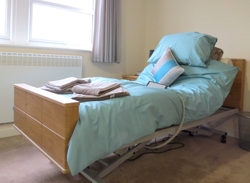Heatherstones Court
Here you can find details on Heatherstones apartments. These are designed to give the time and space for people to adjust, after being in hospital.
Heatherstones Court

Heatherstones Court has 12 apartments that are designed to give you the time and space to adjust, after being in hospital. For a short time, it can also offer the help and support you need, but cannot get at home.
The apartments have all the things you would expect to find at home:
- Kitchen.
- Private bedroom.
- En-suite bathroom facilities.
There are added extras you may need, like items of equipment, a care line or a falls detector. These will be tailored to your needs after you have taken part in an initial assessment with staff.

The staff team is trained to give you the right level of support when you need it. This can be:
- Personal care.
- Practical support.
- Housing advice.
- Therapy to help you rebuild your strength and confidence.
For more details please read:

How to refer someone
To make a referral please contact: Gateway to Care.
Care Quality Commission (CQC) ratings
Reablement
Here you can find details of our reablement service. This gives you the chance to regain your independence in your own home.
Our Reablement Service
You may be referred to Reablement to help you to live independently in your own home. This usually happens when you leave hospital after an operation or illness.
You can also be referred by a social worker or district nurse. This is usually if you need intensive support at home after an illness or physical injury.
You can also make a personal enquiry about using Reablement via the Support and Independence Team. To do this, please contact Gateway to Care who can give you information about the service.
Reablement gives you the chance to regain your independence in your own home. This service is part of a national programme. It focuses the care and support given by us, on the specific needs of people like you.
To watch a video and see how this service may be right for you, visit: Reablement Services Animation (YouTube).
First steps
We will look at your needs to see if this service is right for you. If it is, we agree a plan with you about what you need to live a more independent life.
Together we will look at what you used to do. Then we will find ways of doing as many things as possible for yourself. This can be:
- Finding new ways to do things.
- Looking at the latest equipment and technology to could assist you.
- Offering practical help and encouragement.
Help from Reablement
We will organise a package of care for you. This will focus on everyday issues where you need to re-learn skills, or learn new ones. This will mean that you do not need to rely on others as much. Things like personal care; washing and dressing; helping with memory problems; laundry, cooking and shopping and advice on home safety. Also, to get into the habit of taking prescribed medicines regularly and on time.
We will also help you to use equipment to assist you to be more independent. We can involve your carer or family, so they can help you to stay independent after Reablement has ended.
As you become more independent over the weeks, we will adjust the support we give you. We will usually work with you for up to six weeks. It could be more or less, depending on when you achieve the goal in your plan.
After Reablement
When it ends, we hope that you will not need any more help.
- If you do need more help, we will offer you guidance.
- You may be entitled to a Personal Budget. This helps you to be able to choose the support that is right for you.
Support and Independence Teams
This support will help you to regain your independence after an accident, illness or injury.
Our Support and Independence Teams
The Support and Independence Teams bring together existing community services. This offers an extra level of support to adults who need assistance in their daily activities.
The team will help you to regain your independence after an accident, illness or injury. You may need support to:
- Stop you having to go in to hospital.
- Live at home again after leaving hospital.
- Manage a long-term health condition.
How we work
We are a team of dedicated staff who will support and help you to live an independent life. When needed, we will help with longer term solutions, or ways to deal with a difficult situation. We can help you re-learn recently lost skills or to find new ways of doing things.
We have therapists, nurses and other health and social care staff within the teams who can help you. Here are just a few examples of the support the team can offer:
- Support to make you more independent to be able to do daily tasks. This can be things like personal care, making a cup of tea or a meal.
- Support with managing your medications.
- Help and advice to prevent falls.
- Assistance to regain strength and stamina, or to work on your mobility and confidence.
- Help and advice on communication, swallowing difficulties and dietary needs.
- Assessment of memory and thinking, with advice to improve or compensate for these difficulties.
- Support to return to work following a period of illness.
- Crisis support, where necessary.
How to contact the Support and Independence Team
You can be referred by a health or social care professional. Also, you can contact us if you think that you or someone you know, needs our help.
For more details, contact: Gateway to Care.
Care Quality Commission (CQC) Registration and Reports
CQC registration and reports are available for each of the three teams: